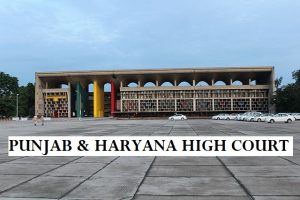 The Punjab and Haryana High Court in the case of BARKHA BANSAL VS. STATE OF U.T., CHANDIGARH & OTHERS & BHARAT LAL VS. DIRECTORATE GENERAL, GOODS & SERVICE vide CRWP-6077-2025 (O&M) & CRM-M-36725-2025 dated 18.07.2025, reiterated that Summoned individuals are entitled to record statements during working hours, in presence of counsel, and under CCTV surveillance if requested. Failure to provide grounds of arrest immediately and conduct interrogations arbitrarily results in illegal detention. The Court held that the overnight detention of the petitioner, without a formal arrest, was impermissible and a gross violation of personal liberty under Article 21. Even if a person remains voluntarily, such extended stay beyond reasonable working hours, especially in a coercive atmosphere, amounts to illegal custody.
The Punjab and Haryana High Court in the case of BARKHA BANSAL VS. STATE OF U.T., CHANDIGARH & OTHERS & BHARAT LAL VS. DIRECTORATE GENERAL, GOODS & SERVICE vide CRWP-6077-2025 (O&M) & CRM-M-36725-2025 dated 18.07.2025, reiterated that Summoned individuals are entitled to record statements during working hours, in presence of counsel, and under CCTV surveillance if requested. Failure to provide grounds of arrest immediately and conduct interrogations arbitrarily results in illegal detention. The Court held that the overnight detention of the petitioner, without a formal arrest, was impermissible and a gross violation of personal liberty under Article 21. Even if a person remains voluntarily, such extended stay beyond reasonable working hours, especially in a coercive atmosphere, amounts to illegal custody.
Facts of the Case: In this case, the petitioner was summoned by the Directorate General of GST Intelligence (DGGI), Chandigarh Zonal Unit. The Petitioner appeared at the DGGI office on 4th June 2025 for recording of statements in relation to an ongoing investigation under the CGST Act.
However, the petitioner was allegedly illegally detained at the DGGI office for over 30 hours, until the evening of 5th June 2025, without being formally arrested. During this period, his statements were recorded at odd hours, and he was denied the presence of legal counsel. Also, the electronic devices (laptop, phone) were allegedly accessed or taken control of without proper procedural safeguards.
The DGGI contended that the petitioner voluntarily agreed to stay and cooperated in the investigation. The petitioner refuted this, stating that the “consent” was obtained under duress, as officers threatened action under Section 132 of the CGST Act. Further, the arrest proposal was initiated by the investigating officer at 5:46 PM on 5th June, and approved by the Additional Director General (ADG) at 6:49 PM. No Document Identification Number (DIN) was issued for the arrest approval, in violation of CBIC Circular No. 122/41/2019-GST dated 5th November 2019.
The petitioner alleged that he was deprived of his liberty in violation of Article 21 and that he was not informed of the grounds of arrest in violation of Article 22(1). His prolonged detention, without formal arrest or procedural safeguards, led to the filing of a writ of habeas corpus.
Issue: Whether the extended detention and subsequent arrest of the petitioner by the DGGI was legal and in compliance with the provisions of the CGST Act and constitutional safeguards under Articles 21 and 22 of the Constitution of India. Whether the petitioner’s statement can be validly recorded beyond office hours and in the absence of his legal counsel, especially when the interrogation exceeds a reasonable time. Whether the arrest process followed by the DGGI, including the absence of a Document Identification Number (DIN), mechanical approval of arrest, and non-disclosure of grounds, is in violation of the law and CBIC instructions.
Held that: The Court held as under:
- Statement Must Be Recorded in Presence of Counsel and During Office Hours – The Court relied on judgment in Mahesh Devchand Gala v. Union of India (Bombay HC) and Agarwal Foundries (Telangana HC) and affirmed that Statements before DGGI must be recorded during office hours. The summoned person has a right to have counsel present in their visual field, though not necessarily within hearing range. The right to request CCTV recording during such proceedings is available, as per SC ruling in Paramvir Singh Saini.
- The Court rejected the DGGI’s claim that the petitioner stayed voluntarily. The atmosphere created by DGGI officials, their power to arrest, and the surveillance induced a sense of fear, rendering any alleged consent illusory and involuntary. Such “voluntary presence” is not valid consent under constitutional norms.
- The Court held that Arrest was proposed and approved mechanically without examining the material on record or issuing a Document Identification Number (DIN), which is mandatory. The absence of DIN and material examination rendered the entire process of arrest and remand vitiated.
- The prolonged detention (30+ hours), overnight interrogation, and extraction of laptop data without proper procedure amounted to informal custody, violating Articles 21 (Right to Life and Liberty) and 22 (Protection Against Arbitrary Arrest). The DGGI failed to justify why interrogation continued at night, which violated principles of due process and fairness.
- The Court emphasized that while investigating agencies have legitimate interests, these must be balanced against constitutional protections i.e. Arrest must not be based on mere suspicion or convenience, Proper recording of reasons, role of accused, and available evidence is essential.
The Court allowed the habeas corpus petition and held that the entire process was illegal, and thus, the petitioner’s detention and arrest stood vitiated. Also, ordered to immediately release of the petitioner, if not already released, and directed the authorities to strictly comply with procedural safeguards in future investigations.
Further, directed the DGGI to undertake internal review of the incident and ensure that no such illegal detention occurs in future. It also observed that the DGGI must issue DINs for all key communications, including arrest memos, as per the CBIC’s standing instructions.
To read the complete judgment 2025 Taxo.online 1612


